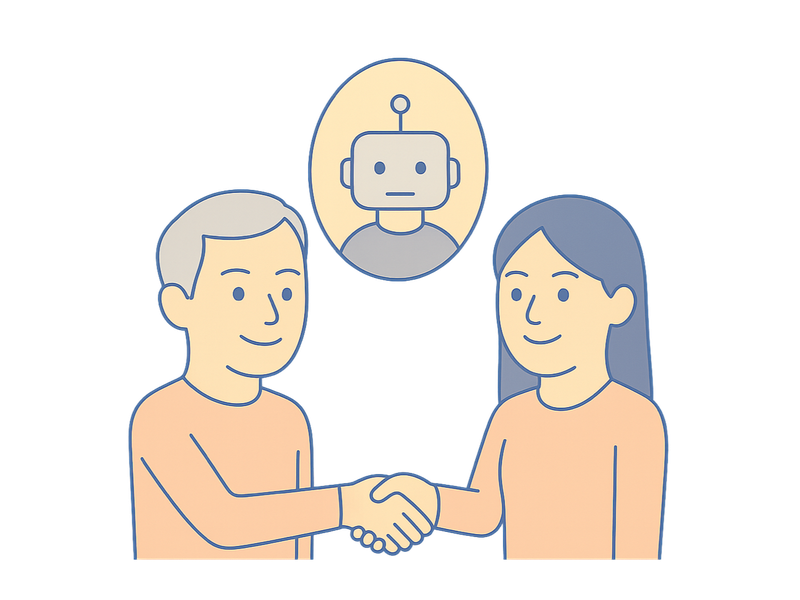The Importance of Human Connection and Creativity in a World of AI

AI is extremely topical at the moment and it seems that whenever I see an article someone has posted, or I receive a link a team member has shared, it is inevitably about AI. So, when I considered writing this article my immediate thought was it should be about something other than AI. Anything other than AI.
Then I began to question why I felt that way.
I’ve never used ChatGPT
The only AI tool I’ve used consciously is Gemini, on just a handful of occasions.
This fact was greeted with a mixture of shock, bewilderment, and dare I say it, light-hearted disdain, at a recent internal leadership meeting.
I do believe as a technology company we’ve an expectation and responsibility to investigate and be aware of advances such as AI.
Indeed, we employ AI as part of our new prototyping service. I’ve watched in awe the passion and enthusiasm our team have for the subject, personally and professionally. I’m also staggered by the power of new AI technology and the incredible, varied ways in which it can be used. The gains in efficiencies and potential productivity continue to astound me. One of our team recently commented that they built a small iOS app using AI over breakfast. What made it even more impressive was he was also dealing with two small children at the time!
I understand the impact AI technology can have on the world
As one of the older members of our team, I’ve witnessed the birth and growth of a number of key technological advancements, notably the internet and smart phones, both of which I embraced.
So, what made me reluctant to adopt AI as readily as others?
I’m aware that the introduction of such technologies brings a darker aspect and the opportunity for them to be abused. A recent example is a BBC article on hackers weaponising AI to commit cyber-attacks and fraud. Similarly, my colleague Reuben expressed his caution in our approach to the adoption of AI in an article he recently wrote. But that’s not the main reason for my reluctance.
Reuben and I were discussing AI recently. He commented that AI was the first technology to make him feel old, and as we talked, I reflected further on where my disinclination to use AI came from.
Our discussion reminded me of a recent occasion when we mountain biked together. In preparation, Reuben asked me if I wanted to hire an electric bike. I immediately said no. On reflection, I realised that was because to me, an electric bike felt somewhat like cheating. I felt using an electric bike contradicted my personal values because if I were to tell people I’d been mountain biking, I would not have been in the purest sense. Honesty and integrity are incredibly important to me, as is challenging myself, and using an electric bike felt as if I was compromising all of those things.
Using AI makes me feel inauthentic
When I employ AI in a creative way, rather than from an efficiency perspective, it compromises my values because I feel disingenuous and inauthentic.
As an example, recently I composed a message for our team. It needed to be carefully worded and I was time constrained. So, I used Gemini to compose the message and spent five minutes adding context, saving myself 20 minutes. I sent the message out and received compliments from other senior members of our team, one stating how empathetically worded it was. I felt slightly guilty. I felt as if I’d taken credit for something I hadn’t created and that didn’t sit well with me. I’d hate to be perceived to be a person who acts in that way.
Honesty, transparency, and authentic communication
When I reflect on my role at Smudge and the approach we take with our customers, so much of it is based on honesty, transparency, and authentic communication.
So much of my role is building and maintaining relationships and showing up as my true self in support of our customers’ challenges, goals, and desired outcomes. I believe I’ve been successful in doing that and now I’m reluctant to allow AI to get in the way of those values.
I’d feel unhappy if the level and depth of engagement I enjoy with people were diminished due to an increased reliance on AI for productivity or efficiency gains. I’d be disappointed if the creativity I invest and employ in my role were diluted through the overuse of AI.
AI can undermine human-to-human connection and creativity
When I showed another colleague an early draft of this article they recalled an out-of-character response to an e-mail they’d recently received from a friend. It gave them cause to pause. They sensed it seemed ill-considered and unlike the person concerned. They questioned whether it was an AI generated response. It was, and this resulted in subsequent tension between them.
I value human-to-human connection and creativity in the people I interact with and I believe they value those traits in me too. My concern is that so many of the ways in which I see AI being used can undermine genuine connection and creativity.
I’m certainly not opposed to AI, but I believe there is a caveat in what we choose to use it for, how often we do so, and, most importantly, how we use it. There is undeniable value in bringing yourself – your personality, your experience, your gut instinct, your passion, and your humour – to its use. I discussed this with a friend who’s an accomplished violinist, and he stated eloquently: “You can teach a robot to play the violin, but will it sound like Beethoven?”
Retaining your human essence in an AI age
When the AI playing field levels and it becomes as ubiquitous as the internet, our human essence and qualities will remain the differentiator. This humanity is important to us at Smudge in the way we work alongside AI, both as a team, and with our customers. It’s important to retain human connection and creativity as we adopt this incredible technology, so AI supplements and supports our human skills, not diminishes or replaces them.
How does your adoption of AI sit with your values? Do you feel it’s a challenge to the authenticity with which you engage with people or your own unique creativity? How are you combatting that, and retaining your own personality and originality, while benefiting from the adoption of AI?
